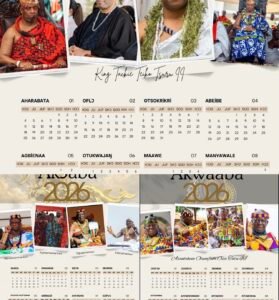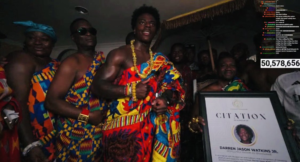
Every now and then, Ghanaian social media births a phrase so catchy and relatable that it spreads like wildfire. From “mukui” to “aswear”, these slang expressions often carry cultural undertones that reflect how we communicate, joke, and sometimes caution each other. The latest phrase causing a stir online, especially on Ghanaian X (formerly Twitter), is “Hand for touch you”.
The last time Ghanalingo featured an online slang, it was the famous ‘mukui’, an online slang used as a go-to term for describing anything or anyone considered unattractive or ugly. This time around, the online slang catalogue moved from a word to a whole phrase and that is the now famous phrase “Hand for touch you”.
The birth of “Hand for touch you” is a perfect example of how language continues to evolve in real time, especially on the internet. While its exact origin is still unknown, it likely started as an inside joke or a local twist on an existing phrase, gaining traction through memes, reactions, and viral videos. Phrases like “Hand for touch you” often emerge out of nowhere, but what makes them stick is how easily people can relate, remix, and reuse them in everyday conversation. Linguists call this kind of formation neologism, the invention of new words or expressions.
At first glance, the phrase “Hand for touch you” may appear simplistic, resembling a phrase taken out of a Ghanaian Pidgin English phrase dictionary. However, a deeper examination reveals its root may come from Akan idiomatic expressions, where body parts often convey meanings in a literal sense. Breaking down the phrase word by word unveils its implications: “Hand” signifies direct contact or action, implying a touch, tap, hit, slap, or even a corrective beating. This expression is full of meaning and emotion, going beyond just the words themselves.
“Hand for touch you” serves as a potent warning or cautionary message, serving as a figurative reprimand aimed at correcting someone’s wayward behavior. It conveys the idea that actions have consequences, emphasizing the need for accountability or discipline. Beyond its literal interpretation, the phrase symbolizes a call to rectify ‘foolishness’ or ignorance. In essence, this phrase illustrates how language can carry cultural wisdom and disciplinary undertones.
The phrase is often used in a playful, sarcastic tone, though it can also carry a serious undertone depending on the context. You’ll find it in comments under wild takes, funny videos, or in reaction to someone doing something reckless or outright disrespectful. For example, someone tweets a crazy opinion like “Banku is better with sugar”, and the replies will be flooded with “Hand for touch you”, a digital way of saying “Stop that nonsense!”
It’s not just the phrase itself that’s funny. It’s the way it’s been adapted across various formats. Memes, skits, and even reaction videos have popped up using “hand for touch you” as a punchline. The creativity of Ghanaian youth when it comes to language and social commentary is unmatched.
What makes this phrase stand out is how naturally it fits into our everyday talk. It sounds Ghanaian. It feels local. It’s raw, unfiltered, and straight to the point, and that’s exactly why it works. In an era where slang spreads fast and dies even faster, “hand for touch you” has shown surprising staying power, making it into casual conversations, WhatsApp statuses, and even mainstream media content.
Language is alive, and Ghanaian youth continue to prove that we’re masters at shaping it to reflect our identity, our humour, and our unique way of dealing with ‘nonsense’ online and offline.So the next time someone says something outrageous, don’t stress. Just smile, shake your head slowly, and say it with pride: “Hand for touch you.”
Editor: Ama Gyesiwaa Quansah





